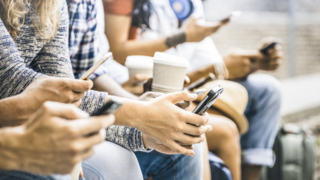Media
Does Social Media Cause Depression?
Many things involving social media can impact depression, studies found.
Posted November 16, 2020

There have been numerous studies that show that social media is linked to depression, loneliness, hyperactivity, poor sleep quality and anxiety. However, these are correlations not causation.
For example, one interesting study of college students at the University of Pennsylvania found that when students decrease their social media use below 30 minutes a day, they have a significant improvement in their well-being.
In fact, many things that social media can impact, like physical activity, sleep deprivation, disrupted concentration and cyberbullying are all linked to depression in many studies. This is why social media usage studies are correlational, rather than causational, because it would be very difficult to tease out what causes the depression. Is it social media itself or the other things associated with social media such as sleep deprivation that cause depression?
Regardless of the cause, we can identify that social media use can lead to feelings of depression and isolation, largely because social media is the language of a virtual world. In this virtual world, we do not get direct contact with other things like touch, subtle social cues or pheromones which are all the things that cause the dopamine in our brain to light up when we are with someone in person. And those face-to-face interactions can be so important, they have even been proven to have a positive impact on longevity. In the study of blue zones, where people live the longest and are the happiest, in-person interaction predicts happiness more than almost any other variable such as diet and exercise.
Right now, we are all having significantly fewer social interactions than we were prior to the pandemic, so it’s normal that people might be feeling a bit isolated. But, social media can drive further feelings of isolation because most people present the happy version of their life rather than the real version of their life. So, it may lead people who are engaged on social media to think that everyone is living in a more perfect world than they are in actually.
For example, if you just broke up with your boyfriend or girlfriend, you might not post it on social media. But, if you had face-to-face contact, you would tell a friend and they would probably give you a hug, give you advice, or talk about their own previous breakups and what they learned. These social and emotional reciprocity exchanges between friends and family decrease your feelings of loneliness, make you feel more connected to the people around you, and protect against depression.
So what can we do? Well, as I mentioned, studies have shown that limiting social media use to less than 30 minutes a day can help improve your well-being. Set those Screen Time app limits to keep yourself honest! Another option is to turn off all alerts on your phone. By using alerts, phones and apps are designed to keep you interested and distract you from being present in the moment (see The Social Dilemma movie!). I highly recommend turning off any alerts on your phone or messenger tools that you get, including email and text alerts. This may limit the addictive quality of social media and encourage you to foster more face-to-face, empathetic connections with your loved ones.
Oh, and one last thing. During this campaign season, it can also be dangerous to engage in political discussions on social media. These can get very upsetting and may end up becoming a dead end for you and the others around you. Politicizing social media will likely just upset you, become polarizing, and could damage otherwise healthy relationships with family and friends. I also recommend that you unfriend, or make silent, those who have very politicized posts to avoid getting caught up in the negativity train.
Follow me on Instagram @shamelesspsychiatrist and sign up for my newsletter.


